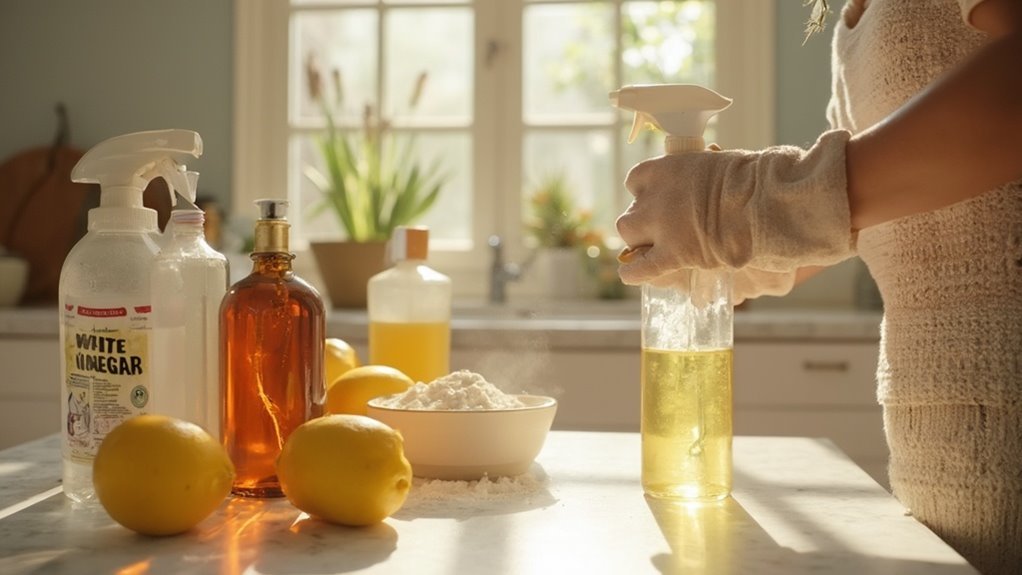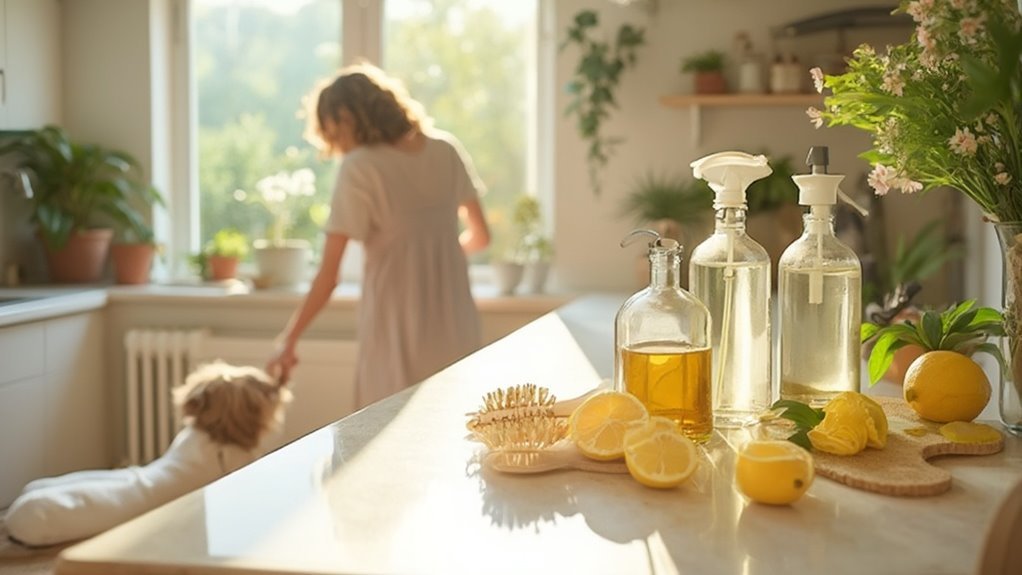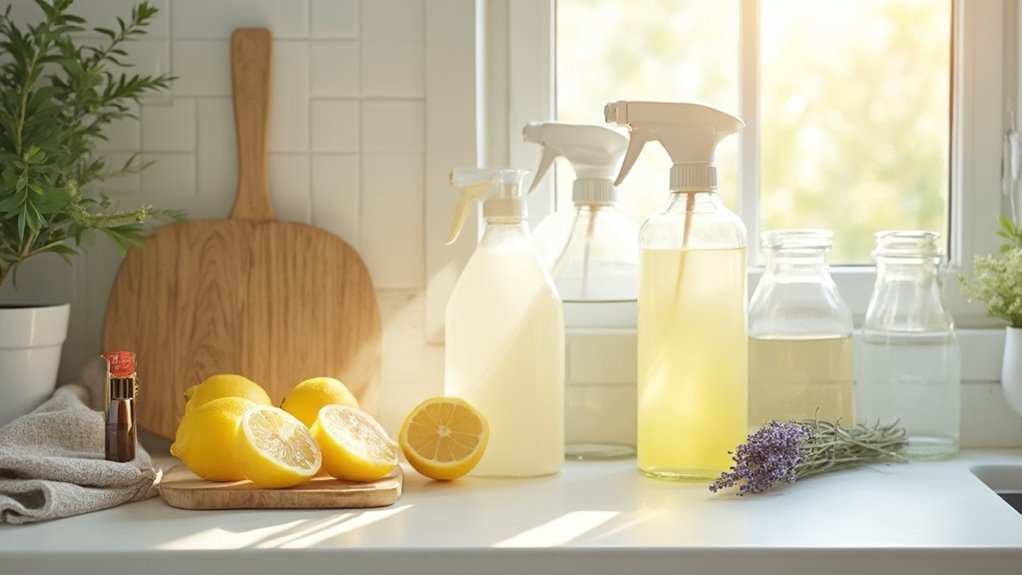Organic cleaning supplies eliminate the health risks posed by conventional products’ toxic chemicals, which can trigger respiratory issues and disrupt hormones in your family and pets. You’ll enjoy improved indoor air quality without volatile organic compounds while preventing harmful chemical runoff that damages watersheds. Plant-based ingredients like citric acid and essential oils effectively clean surfaces while being biodegradable and environmentally sustainable. Beyond creating a safer home environment, these natural alternatives protect our broader biosphere for generations to come.
Key Takeaways
- Organic cleaners eliminate health risks by avoiding harmful chemicals that trigger respiratory problems, skin irritation, and hormone disruption.
- Natural ingredients like citric acid and essential oils effectively clean surfaces while providing antimicrobial properties without toxic residues.
- Families and pets benefit from reduced exposure to respiratory irritants, potential carcinogens, and chemicals that can cause allergic reactions.
- Biodegradable cleaning solutions protect waterways from chemical pollution that harms aquatic ecosystems and disrupts watershed systems.
- Proper use of organic cleaners maintains a consistently clean home while improving indoor air quality and promoting sustainable consumer practices.
The Hidden Dangers of Conventional Cleaning Products

While many consumers remain unaware of the potential health risks lurking under their sinks, conventional cleaning products contain a cocktail of synthetic chemicals that can greatly impact both human health and environmental networks.
You’re exposing yourself to toxic chemicals like phthalates, perchloroethylene, and quaternary ammonium compounds daily. These substances can trigger respiratory issues, skin irritation, and have been linked to hormone disruption and neurological damage with prolonged exposure.
Consumer awareness is growing, but manufacturers aren’t required to list all ingredients on their labels, leaving you in the dark about what you’re actually bringing into your home.
When these chemicals wash down your drains, they contribute to water pollution and can harm aquatic habitats, creating environmental damage that extends far beyond your household.
Essential Ingredients in Quality Organic Cleaners
Unlike their chemical-laden counterparts, genuine organic cleaners derive their effectiveness from plant-based ingredients that work harmoniously with natural biochemical processes.
When selecting quality organic cleaning products, you’ll want to identify key active ingredients like citric acid from lemons, acetic acid from vinegar, and sodium bicarbonate (baking soda).
Essential oils serve dual purposes in organic formulations—providing antimicrobial properties while delivering pleasant aromas without synthetic fragrances.
Tea tree, lavender, and eucalyptus oils offer powerful disinfecting capabilities. Plant extracts such as soapbark (quillaja) create natural surfactants that break down grease and grime effectively.
You’ll also find enzymes derived from fruits that digest protein-based stains and coconut-derived cleaning agents that foam naturally.
These ingredients biodegrade completely, leaving no harmful residues on surfaces or in waterways.
Health Benefits for Your Family and Pets

The ingredients in organic cleaning products offer considerable health advantages that extend beyond environmental benefits. When you switch to organic cleaners, you’re reducing your family’s exposure to respiratory irritants, hormone disruptors, and potential carcinogens found in conventional products.
Studies show that synthetic fragrances and harsh chemicals can trigger asthma attacks, allergic reactions, and skin inflammation.
Synthetic chemicals in conventional cleaners may worsen respiratory conditions and cause painful skin reactions.
Your pets benefit greatly too, as they’re more susceptible to chemical toxicity due to their smaller size and tendency to walk on, then lick, treated surfaces.
Organic alternatives support family well-being by eliminating toxic residues that can accumulate over time. For pet safety, these gentler formulations prevent paw irritation and accidental poisoning when curious animals investigate freshly cleaned areas.
The absence of strong chemical odors also creates a more comfortable indoor environment for everyone.
Environmental Impact: Beyond Your Four Walls
When your conventional cleaning products wash down the drain, they contribute to chemical runoff that compromises local watersheds and aquatic habitats.
The volatile organic compounds (VOCs) in these products don’t just dissipate but remain in your indoor environment and eventually migrate outdoors, degrading regional air quality and contributing to smog formation.
These environmental disruptions create ripple effects throughout biodiversity chains, affecting everything from soil microorganisms to apex predators that maintain habitat balance.
Watersheds at Risk
Conventional cleaning products don’t simply disappear once they’ve swirled down your drain—they begin a journey through our interconnected watershed systems, often carrying toxic surfactants, phosphates, and volatile organic compounds with them.
These chemicals bypass most water treatment facilities, flowing into rivers, lakes, and groundwater. Studies show that chemical runoff from household cleaners contributes notably to watershed pollution, disrupting aquatic habitats and reducing biodiversity.
You’ll find evidence of this contamination in altered pH levels, increased algal blooms, and compromised reproductive health of aquatic species.
When you choose organic cleaning supplies, you’re preventing these harmful substances from entering the water cycle. Your decision creates a protective barrier between your home’s wastewater and the fragile watershed networks that sustain both wildlife and human communities downstream.
Air Quality Matters
Many households unknowingly contribute to indoor air pollution that doesn’t just remain trapped within their four walls. When you spray conventional cleaners, you’re releasing volatile organic compounds (VOCs) that compromise respiratory health and infiltrate the broader environment.
These indoor pollutants don’t simply dissipate—they escape through ventilation systems and open windows, contributing to regional air quality degradation.
Your cleaning choices directly impact the atmosphere’s chemical composition. Studies show that petroleum-based cleaners emit as much air pollution as vehicle emissions in some urban areas.
Biodiversity Chain Effects
The ripple effects of household cleaning products extend far beyond air quality, reaching deep into aquatic habitats and soil networks.
When you rinse chemical cleaners down drains, they eventually enter waterways, disrupting environmental balance through bioaccumulation in aquatic organisms.
Your cleaning choices create a domino effect throughout the food web.
Synthetic surfactants can destroy protective mucus layers on fish, while phosphates cause algal blooms that deplete oxygen.
Conventional products compromise microbial soil communities that plants depend on for nutrient cycling.
Effective Cleaning Techniques With Organic Supplies
While shifting to organic cleaning supplies marks an important step toward environmental sustainability, mastering efficient application techniques maximizes their effectiveness and extends their utility. You’ll find that natural stain removers often require longer contact time with surfaces, while eco-friendly disinfectants need proper dilution to maintain their antimicrobial properties.
| Surface Type | Recommended Organic Product | Application Technique |
|---|---|---|
| Countertops | Vinegar solution | Spray, wait 5 minutes, wipe |
| Floors | Castile soap mixture | Damp mop, air dry |
| Bathroom | Baking soda paste | Apply, scrub, rinse thoroughly |
For best results, always test products on inconspicuous areas first. Remember that organic cleaning often leverages mechanical action rather than harsh chemicals—your scrubbing technique becomes particularly important when using gentler formulations.
Building Your Non-Toxic Cleaning Arsenal

Now that you’ve mastered application techniques, assembling a thorough non-toxic cleaning kit becomes your next practical step.
Begin with multi-purpose cleaners containing plant-based surfactants that break down grime while remaining biodegradable. Include white vinegar, baking soda, and pure castile soap as your foundation ingredients.
For specialized needs, seek sustainable brands like Ecover, Seventh Generation, or Biokleen, which offer targeted alternatives without compromising ecological values. These companies employ renewable resources and minimal packaging.
Complement commercial products with DIY recipes: mix 1:1 vinegar and water for windows, or combine ½ cup baking soda with enough liquid castile soap to form a paste for scouring surfaces.
Store homemade alternatives in glass containers with clear labels indicating contents and creation date. This approach minimizes chemical exposure while maximizing cleaning efficacy.
Conclusion
You’ve now discovered why organic cleaning supplies aren’t just an option—they’re essential for maintaining a truly clean home. By switching to plant-based formulations, you’re eliminating toxic chemical exposure, protecting indoor air quality, and reducing your household’s environmental footprint. Remember, effective cleaning doesn’t require harsh synthetics. Your conscientious choice ripples beyond your home, contributing to watershed protection and biodiversity preservation with every spray, scrub, and wipe.

